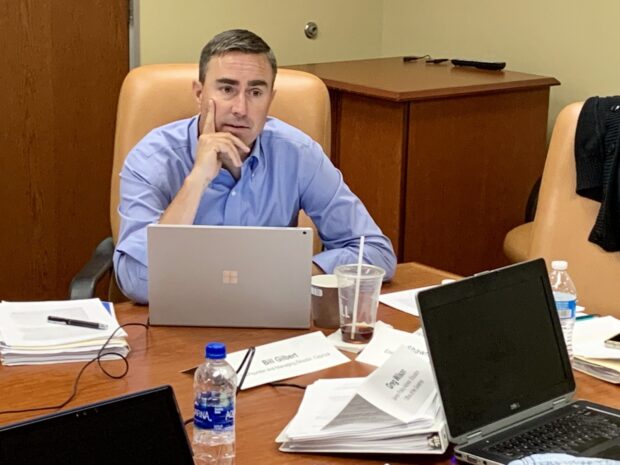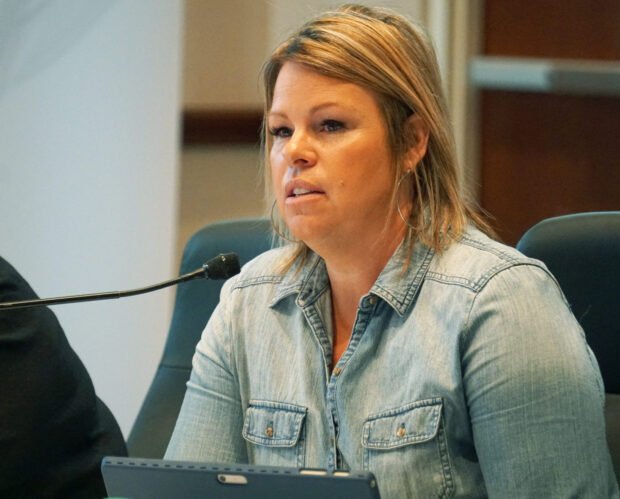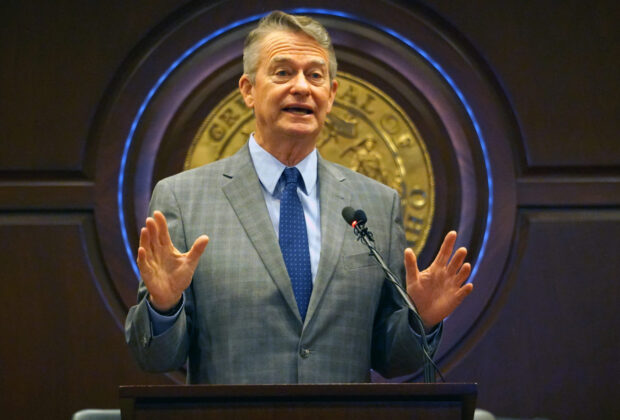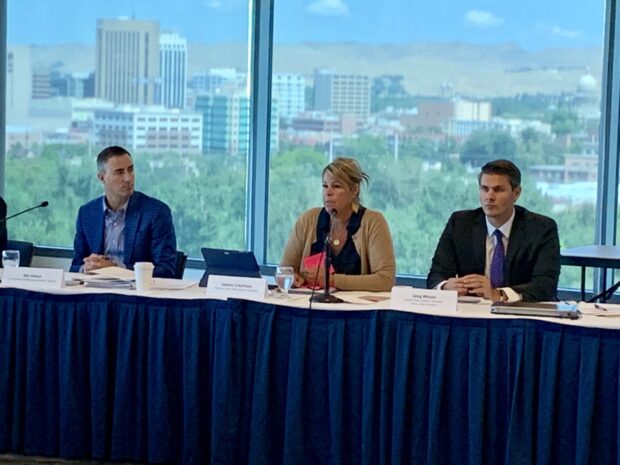Bill Gilbert hesitated when Gov. Brad Little asked him to serve as co-chair of his K-12 education task force, “Our Kids, Idaho’s Future.”

Gilbert is a Boise-based businessman who has founded companies, served on corporate boards and helped his alma mater’s foundation and the University of Idaho’s search for new administrators.
He even served on Little’s transition team after the 2018 election.
But, aside from his experience on the Idaho Business for Education board, taking his four children to school and helping them with homework, he had little K-12 experience, let alone expertise.
“There was a significant moment of pause, for a couple reasons,” Gilbert said. “The lack of familiarity with the educational system from a nuanced perspective, secondly the sheer size of the responsibility, both in terms of time and magnitude, third, I would say, self-critically, am I the right guy to help do this?”
In the end, he said yes for a couple of reasons.
“When the governor asks you for something that you know you believe in, if you care about the state, if you believe in the man — the governor — and believe in the mission, then you have a responsibility to say yes and then do your best,” he said.
Gilbert knew he would bring different skills to the task force as an outsider who knows how to run meetings, have hard discussions and get results.
“He wanted someone from the outside,” Gilbert said. “That has advantages and disadvantages. Yes, I don’t have that institutional memory. But the advantage is I don’t have institutional bias one way or the other. It’s a fresh set of eyes I bring to the process.”
Once Gilbert said “yes” that hard work really began.
“You can’t fake it,” he said.
After Little announced the task force in May, Gilbert quickly realized he would need to attend every meeting, and each of the four subcommittee meetings.
That meant sacrificing much of his summer and corporate life to attend up to two day-long meetings each week, plus all the preparation, follow up work, texts and emails.
He ramped up his reading.
He consulted with fellow businessman Bob Lokken, who helped lead former Gov. Butch Otter’s higher education task force and served on Otter’s 2013 K-12 task force.
He met regularly with friend and IBE President Rod Gramer.
And he leaned on his co-chair, State Board of Education President Debbie Critchfield.
Before long, Gilbert was confidently navigating a minefield of education jargon, mastering an alphabet soup of acronyms and engaging in nuanced discussions of topics like teacher evaluations.
Gilbert’s preparation and energy for the volunteer gig is now legendary among task force members.

“I knew Bill would do a good job, but I have been blown away by how quick of a study he is,” said Greg Wilson, Little’s education liaison.
Critchfield hadn’t met Gilbert until Little’s May 15 press conference introducing the two of them as task force co-chairs.
But it didn’t take long for Gilbert to make an impression.
“The experience of working with him in a very short period of time has been nothing but positive,” said Critchfield, noting they talk or text up to five days a week, even during weekends, birthdays and holidays. “Bill has energy and passion, and he has a critical eye for getting to the heart of an issue quickly.
“He hasn’t been a lawmaker, he doesn’t bring with him years of experience in the education world, which I know on the surface some took as a negative,” Critchfield continued. “But I will defend that guy every day of the week for the work he has put in.”
Who is Bill Gilbert?
A native Idahoan, Gilbert has family from the Bruneau-Grandview area, and he grew up in Boise attending public schools.
He graduated from Borah High.
He went on to the University of Idaho, where he studied finance before graduating in 1997.
He immediately entered the job market after school as a financial analyst with Smith Barney.
Less than 10 years later, Gilbert was helping launch businesses of his own. In 2005, along with some partners, he co-founded Caprock, where he works today.
“We act as chief investment officers and chief financial officers for families with very large and sophisticated balance sheets,” Gilbert said.
Today, Caprock maintains six different offices, employs about 35 and advises on more than $3.5 billion in client assets. He said the firm “has a Western footprint in terms of offices, but a national footprint in terms of business.”
Gilbert’s connections to Little
Gilbert was a teenager when he first me Little. Gilbert’s mother’s side of the family hails from the Bruneau area, where members were involved in the cattle business and crossed paths with Little, who made a career as a rancher and cattleman outside of his political service.

Although Little is about 20 years older than Gilbert, both are University of Idaho graduates who remain active in the university community as prominent alumni.
Once Gilbert established himself in the finance world, Little’s son, David, interned with him while in college, further strengthening the bond between the families.
“There were a lot of touch points, I’ve known (Little) a long time,” Gilbert said.
Weeks before the contentious, six-person Republican primary election for governor, Gilbert contributed $1,500 to Little’s campaign, according to campaign finance disclosure records posted by the Idaho Secretary of State’s office.
Those connections bred trust between the two men. Shortly after he was elected governor in 2018, Little tapped Gilbert to serve on his transition team.
Then, Little appointed Gilbert to serve as co-chairman of his K-12 education task force, an unpaid, volunteer position.
Wilson, Little’s education liaison, said Little didn’t take the appointment lightly. Education, particularly literacy, is a top priority for the governor, and the task force is expected to help develop Little’s education agenda — one he will carry through the remaining three-plus years of his first term.
Little knew he had the right people serving on the task force, but he needed a facilitator to spur them into action, Wilson said.
“The governor trusts him and he has, largely, a very similar philosophy and outlook as the governor,” Wilson said. “Because of our timeframe, we needed someone who had really prominent board experience who could drive the committee to get work done in a four-month timespan.”
The two are so close, Gilbert feels comfortable speaking for Little. During a task force meeting earlier this month, Gilbert pointedly replied to a legislator that the career ladder salary law is important to Little and Little would not entertain a proposal to scrap it.
Goals for the task force
Since May, Gilbert has spent a lot of time thinking about goals for the state’s K-12 system, particularly as they relate to Little’s two focal points of college-and-career readiness and K-3 literacy. Gilbert, along with Critchfield, took the lead in proposing a new state accountability system that is laser-focused on growth in literacy.

He said his goals for the task force itself are similar.
“By one dimension, it’s already successful by the continued cooperation and collaboration between all stakeholders,” Gilbert said. “That can have no other effect but to help the system be better.”
But, at the end of the day, it comes down to increasing student achievement.
“If we can help improve student achievement across the state in all areas, whether urban or rural or remote, if we can help educators feel more valued and be more successful, if we can help administrators have a system to be more effective and we’re driving student achievement and set a direction to improve outcomes over the next five years, that will be success. I am confident that is the direction we are heading,” Gilbert said.
Next up, the K-12 education task force meets Sept. 13 in Pocatello. The task force is expected to issue five or six recommendations by Oct. 1. If Little accepts them, he will likely try to implement the recommendations during the next three legislative session.
So far, potential recommendations include:
- A new school accountability system focused on growth on the Idaho Reading Indicator (IRI) assessment, as compared to schools with similar demographic characteristics.
- Increasing state funding for veteran teacher pay by building out a new rung of the career ladder salary program that would pay out up to $60,000.
- Offering all-day kindergarten.
- Putting more money into the K-12 education savings account, the Public Education Stabilization Fund, to help soften the blow of a potential economic recession.
